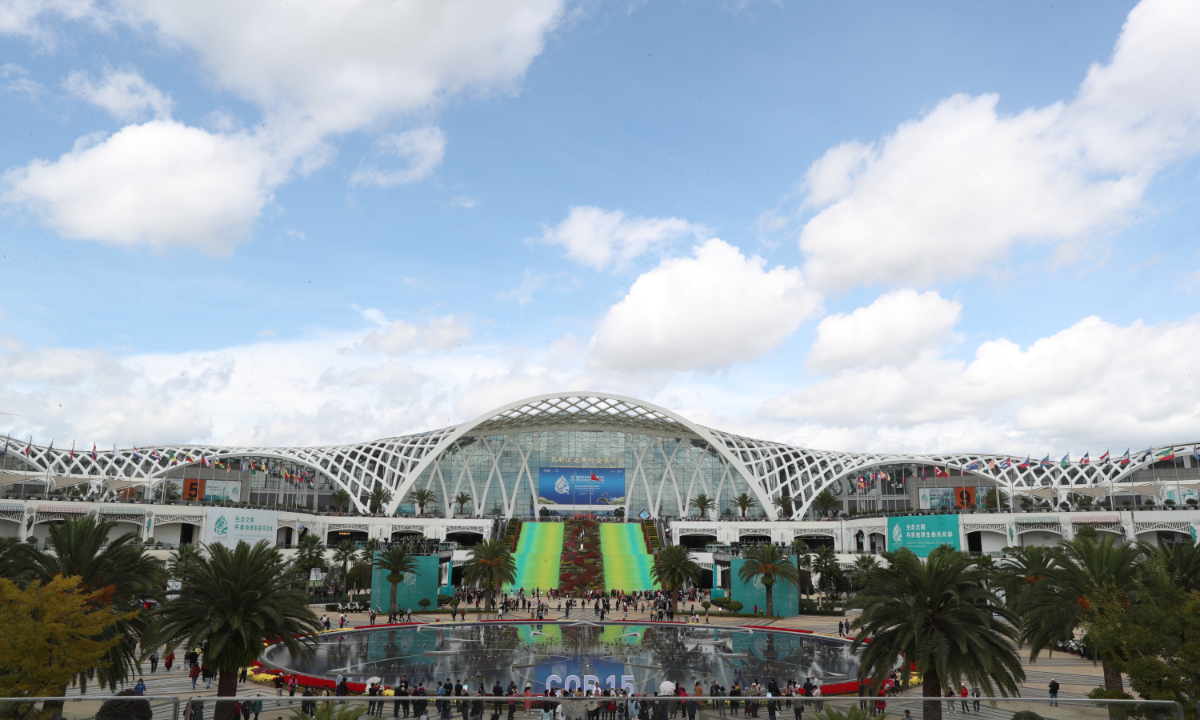
People gather at the Kunming Dian-chi International Convention & Exhibition Center, a venue of the first phase of the 15th meeting of the Conference of the Parties to the United Nations Convention on Biological Diversity (COP15) in Kunming, Southwest China's Yunnan Province. The second phase of the COP15 will be held in Montreal, Canada in Dcember. File photo: VCG
Positive progress has been achieved and critical and difficult issues are expected to be addressed through high-level meetings with all parties' greater courage, wisdom and determination needed to close gaps and divides to promote reaching a final outcome at a key UN biodiversity conference, Huang Runqiu, China's Minister of Ecology and Environment, said Tuesday.
At the halfway stage of the second phase of the 15th meeting of the Conference of the Parties (COP15) to the UN Convention on Biological Diversity in Montreal, Canada, Huang, also the president of the COP15, told a press conference that with the broad participation of all stakeholders, a clear roadmap has been drawn up for the conclusion of the framework after consultations with all parties.
Progress includes the passing of more than one-third of the decisions that need to be made at the conference, with only those issues that require high-level political impetus, and those that are interlinked with other issues left to be solved, Huang said. In some key areas, all parties held in-depth exchanges on their positions and views, he added.
The UN biodiversity negotiation started last week and has entered a critical stage with less than one week left for the outcome document on reversing global biodiversity loss for discussions. There will be a ministerial-level meeting scheduled from December 15 to 17 for negotiation on difficult issues concerning the document.
It is expected that all the issues except for the package plans will be completed as of December 17 when the ministerial-level meeting stage concludes.
So far, 167 ministerial representatives from 155 parties and two observer states have confirmed their attendance at the high-level meeting to be held from December 15 to 17. Meanwhile, senior representatives of 71 international organizations and institutions have confirmed their attendance at the meeting. A total of 18 ministers and 35 heads of international organizations have confirmed they will deliver speeches at the high-level meeting.
According to Huang, high-level ministerial meetings are of great significance to the success of the COP15. The ministers' statements and commitments will help build a global political consensus on biodiversity conservation.
As environment ministers from around the world begin to arrive in Montreal, divisions on the difficult issues during the COP15 talks have been contributing to a growing concern of a "Copenhagen moment," referring to the 2009 UN climate summit when talks ended with a weak final agreement in the Danish capital, not the "Paris moment for nature" leading environmental figures had been calling for.
According to Huang, the negotiations have left a number of difficulties at technical level, which are very complex and critical. "We trust the decisiveness of our policymakers to find the answers, and we will ask them to join us in the negotiations to work together to reach solutions and conclusions to these critical and difficult issues," Huang said.
In terms of what kind of "framework" can be considered successful, Huang thinks that it depends not only on what kind of achievements can be made, but also on how much can be realized in the future.
Playing its role as President, China hopes that all the goals and commitments reached at this summit can be accepted by all parties and can stand the test of time, Huang said. Only if both developed and developing countries feel that the goals and commitments are met can be a real success, Huang added.
According to Huang, the key to achieving this goal is to strike a balance between the ambition and pragmatism of the framework. It refers to the resource mobilization system in line with the framework goals, including funds, technology and capabilities, the effective implementation of the framework and the full participation of the parties and stakeholders involved.
Huang called for greater courage, wisdom and determination from all parties to close gaps and divides to promote reaching a final outcome at the key UN biodiversity conference.
Global Times

